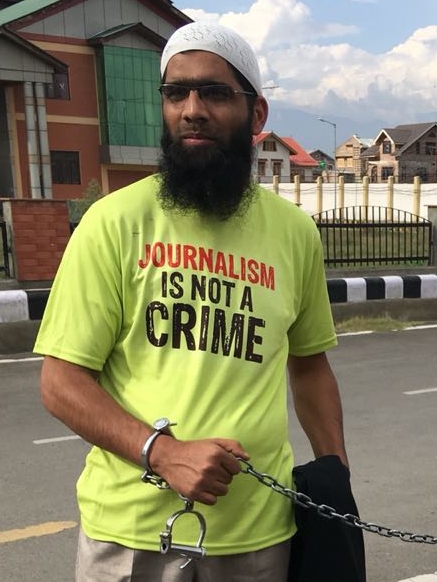Srinagar: Amnesty International India on Tuesday said that the intimidation, harassment, and detention of journalists in Jammu and Kashmir, by the state, threatens basic freedom of expression norms.
“What we are witnessing in the valley is a new form of censorship where journalists are detained for doing their job. The recent arrest of Kashmir-based journalist Aasif Sultan and the subsequent suspension of the Twitter handle of his employer, ‘Kashmir Narrator’, raises serious concerns about the deteriorating state of press freedom in Jammu and Kashmir,” Amnesty International India said in a statement here.

The statement said: “According to media reports, Aasif Sultan, who works as an Assistant Editor at ‘Kashmir Narrator’, was picked up from his residence and detained by Jammu and Kashmir police on the night of 27 August 2018. He was formally arrested on 1 September for his alleged involvement in an incident of gunfire between government forces and ‘militants’ in Batamaloo area of Srinagar on 12 August 2018. In its submissions before the court, the police said that through his writings, Aasif would “often give coverage to Hizbul Mujahideen terrorists, especially Burhan Wani, to attract youth towards terrorist organizations, especially Hizbul Mujahideen.” The police have booked Aasif with offenses under the Ranbir Penal Code and the Unlawful Activities (Prevention) Act (UAPA), including relating to conspiracy, harboring a ‘terrorist’ and ‘support given to a terrorist organization’.
Speaking to Amnesty International India, Showkat A Motta, Editor-in-Chief of ‘Kashmir Narrator’, dismissed the allegations made by the police. “It is harassment by the police and an attack on the rights of a journalist. Aasif is being targeted for his journalistic work. In the July 2018 edition of our monthly, Aasif wrote an article titled ‘The Rise of Burhan’. Police had taken note of the article. The Criminal Investigation Department (CID) emailed us a list of questions about the article and asked us to respond within two days. The email also had a list of words that police considered ‘objectionable’,” Showkat said.
Showkat also said that police have been questioning Aasif for his work on conflict-related issues. “Aasif is being questioned for not writing about development. While meeting police officials during the past week, I was asked questions about Aasif’s political ideology,” he said.
Meanwhile, Kashmir Narrator’s Twitter account has been blocked. The reason provided on Twitter is, “Account withheld – @KashmirNarrator’s account has been withheld in India in response to a legal demand”.
“The use of a draconian law like the UAPA against media persons is an attempt to stifle journalism in Jammu and Kashmir. The law is often used to arbitrarily detain people who are peacefully exercising their right to freedom of expression. People, the state considers a threat, are held in detention without charge for up to six months,” said Zahoor Wani.
Background Information
This is not the first time journalists have been targeted in Kashmir. Since 1990, 19 journalists have been killed in Jammu and Kashmir by unidentified gunmen, armed groups and Indian security forces. Dr Shujaat Bukhari, a renowned journalist, was shot and killed outside his office in Srinagar by unidentified gunmen, earlier this year.
Last year, a photojournalist, Kamran Yousuf, was arrested by the National Investigation Agency (NIA) and charged with several criminal offences, including under the UAPA. He was released on bail after being held in pre-trial detention for six months. Amnesty International believes the charges against him to be fabricated and politically motivated, and part of an attempt to stifle freedom of expression in Kashmir. In July 2018, another journalist, Auqib Javid, associated with the daily, ‘Kashmir Observer’, was summoned and interrogated by the NIA for his interview with Aasiya Andrabi, a separatist leader.
In October 2016, the Jammu and Kashmir government banned the publication of Kashmir Reader, an English daily, for three months, calling it a threat to ‘public tranquillity’. Authorities exert pressure on journalists and media houses to report on issues in a manner deemed appropriate by them. In October 2017, the Home Ministry wrote a letter to senior officials of the Jammu and Kashmir state government and police, stating, “It is understood that some newspapers in J&K are publishing highly radicalised content … publishing of anti-national articles in the newspapers of the state should be strictly dealt with. Such newspapers should also not be given any patronage by way of advertisements by the state government.”
Several lawyers and human rights defenders have been subjected to arbitrary detention under draconian laws like the UAPA, India’s principal anti-terror law. Parts of the UAPA do not meet international human rights standards and are likely to lead to human rights violations. For example, the UAPA dilutes the evidentiary requirement for convictions and uses sweeping definitions of ‘acts of terrorism’ and ‘membership’ of ‘unlawful’ organizations.”
